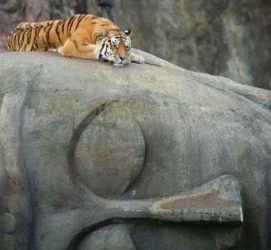http://www.randomhouse.ca/hazlitt/feature/should-we-punish-cowards
Fears. We all have ’em. But bravery or courage — which to me means doing the right thing despite being afraid, even terrified to the point of near-paralysis– that’s much more rare. According to this article, we’ve changed the definition to being the simple act of accepting our fears. That’s kind of a warmfuzzything, not bad; but doesn’t that mean we’re lowering the bar too much, and not asking enough of ourselves? A sort of suburban version of the battle with nature, bloody in tooth and claw? Maybe we’re getting too soft?
I’m working on a story where the people must decide, over and over, how to act in spite of fears. It’s made me realize that it is a process that is never finished. Courage can be seen in ordinary people facing extraordinary challenges — cancer comes to mind, for instance. It isn’t always looking down the barrel of a gun. But as a culture, and as the roles of men seem to be changing without good alternatives being offered, the way we value, or devalue, bravery in traditional or new ways is a troubling issue…
I’d like to hear from others on how you define bravery, and what you think of the article.


That article had my brain twisting because I believe it was twisting 2 separate notions, valid in the context of the societal consciousness of World War I, but unrelated to the act or definition of bravery itself, at any time, past or future. Considering the shame (another emotion like fear ) there was to admit to debilitating emotional issues 60 years ago, one can understand how cowardice during war was dealt with – without emotion. Emotions were not allowed or discussed and only the strong survived – literally. (apologies for grammmatical errors ) Bravery, on the other hand is bravery. It doesn’t hold hands with fear or intelligence in the way it’s attached to delving into your own psyche. There is bravery in infiltrating your own psychological problems of barbed wire and land mines. Without the bravery of individuals to acknowledge their own weaknesses, or illnesses, or challenges of dyslexia, depression, anxiety, alcoholism, etc. many people would not be healthier to live a better life but also to be better people in society and in their family. I think the author was very passionate about the subject and I do see her point. I just wouldn’t relate the “cowardice” of WWI soldiers to the meaning of bravery at any time. Cowardice still lives but it is not a determining factor of bravery. That would be like saying the dark affects the sun. They are related, and the sun can diminish darkness but the reverse is not true. Jayne
LikeLike
I don’t disagree that it takes courage to face one’s fears. And we get plenty of chances to do that, even if we’re not extraordinary at all. Learning and growing takes guts. Too many don’t do enough of that. Anyone who has faced something like cancer is given the opportunity to deal with emotions and challenges that can lead to a quiet heroism that is remarkable.
The point in her article that caught my eye was when she argues that we have, perhaps, come to glorify fear. In other words, I hear her asking: “have we gone too far?”
Plus, courage and bravery have often been framed in terms of the martial virtues, doing things in the face of the enemy that epitomize sacrifice and action in spite of terror. That doesn’t translate well to how to be brave in the job, or other daily lives. I would argue that because courage is not demanded there — usually, compliance is preferred to minimize conflict — it actually takes more courage to live an ethical life.
I just have this sneaky suspicion that we look at the person who is afraid of something, and we don’t want to tell them that a fear of getting rid of crap from their house, or losing weight is on a par with facing cancer. We accept pat excuses too easily. We are apparently afraid to say to the former, “Oh, just suck it up and rent a dumpster!” I look at all the reality TV and most of it is a kind of glorification of the banal for profit, and it’s dumbing us all down. The movie “Idiocracy” did a good job of satirizing this.
I think the idea of elevating courage and bravery, of telling children that nothing worthwhile is easy, of redefining heroes and heroines to be ideals to be aspired to, would be better. And in the mystery/crime genre, the typical anti-hero hero is someone who courageous because he or she refuses to accept the many little corruptions and BS and delusions that are everywhere. Everyone wants to belong, to be accepted, but this person believes there are some things, like integrity, or justice, that just cannot be compromised. We admire Jack Reacher or the characters of Dashell Hammet or Harlan Coban for just that reason. /end of sermon 🙂
LikeLike
I hear what you’re saying. I agree and I don’t believe in always being nice about saying things that need to be said.
LikeLike
🙂 I’ll bet you’re nicer than I am, though.
LikeLike
I’m very nice until I see that niceness is not getting anywhere, and I do try to be nice for as long as I can. I don’t die on every hill. You have to pick your fights well.
LikeLike